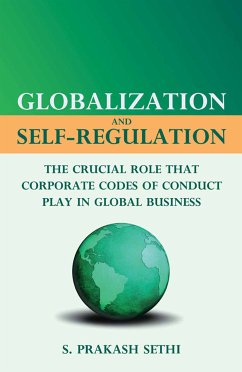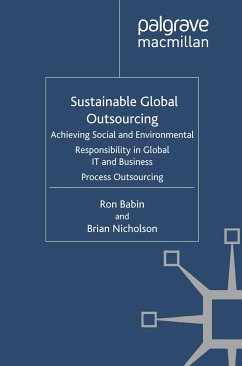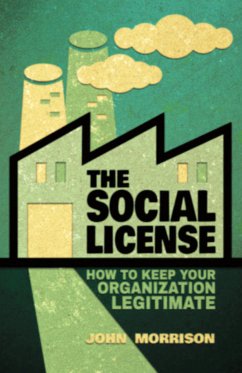Dieser Download kann aus rechtlichen Gründen nur mit Rechnungsadresse in A, B, BG, CY, CZ, D, DK, EW, E, FIN, F, GR, HR, H, IRL, I, LT, L, LR, M, NL, PL, P, R, S, SLO, SK ausgeliefert werden.
"Globalization and Self-Regulation is an unusually valuable contribution to business decision-making as well as public and private responses to the powerful impacts of business on the larger society. This book presents the comprehensive work on the foremost pioneer in developing corporate codes of conduct. S. Prakash Sethi, the editor and chief contributor, draws on his unique combination of innovative academic research and practical field experience dealing with the major business and NGO leaders in this important field." - Murray Weidenbaum, Founder and Honorary Chairman, Murray Weidenbaum Center on the Economy, Government, and Public Policy, Washington University in St. Louis
"It has become chic to dismiss codes of conduct. 'Companies,' we learn, 'must move beyond mere compliance.' Professor Sethi and his colleagues put the lie to this tired slogan, showing why globalization is a whole new game, with a need for a whole new set of rules. Already a commanding voice in the business ethics movement, Sethi uses his decades-long experience to expose both the power and perils of self-regulation." - Thomas Donaldson, Mark O. Winkelman Professor, Wharton School of the University of Pennsylvania and Director, Zicklin Center for Business Ethics Research, The Wharton School, University of Pennsylvania"This seminal volume, written by Professor S. Prakash Sethi and his colleagues, represents an authoritative contribution to the literature on corporate codes. A particular strength of this volume is its thorough field testing of particular organizations and industries and their voluntary codes of conduct. The volume includes in-depth examination of seven industries from around the world. In doing so, the volume addresses corporate codes at various levels (company, industry, universal). The volume s fascinating chapters offer a rich source of insights on corporate codes of conduct for both academics and practitioners. I strongly recommend this book to anyone with an interest in the topic." - Adam Lindgreen, Professor at Cardiff Business School, U.K. and co-section editor of the Journal of Business Ethics section on corporate social responsibility"In Globalization and Self-Regulation Prakash Sethi deals with a critically important topic in an intelligent, comprehensive and accessible manner. Few companies will escape pressures for self-regulation, for participation in voluntary codes of conduct, whether at the company, industry or more general level. What Sethi deems "private law" and the emergence of Public-Private Partnerships have become a fact of life in our global, digitally connected world. The case studies in this book provide very rich and well-developed studies of attempts at codes in a variety of industries, countries and issue areas. Globalization and Self-Regulation is essential reading for both practitioners who need to deal with self-regulation and academics who study the phenomenon." - Stephen J. Kobrin, William Wurster Professor of Multinational Management, The Wharton School, University of Pennsylvania
"An outstanding contribution to thereality of governance on the global stage: a must read." - Professor Andrew Kakabadse, Cranfield University School of Management
"Globalization and Self-Regulation offers a "no-holds-barred" assessment of voluntary corporate codes of conduct. In this edited volume, S. Prakash Sethi supplements his own long involvement with corporate codes by drawing on contributors with similar practical experience. The resulting case studies represent a "field test" of code mechanisms, providing candid critiques across a range of voluntary codes. While the overall assessment is sobering, Sethi s evaluation criteria provide a way to screen proliferating corporate codes to distinguish public relations tools from practical operational guidelines." - John, Kline, Professor of International Business Diplomacy in the Walsh School of Foreign Service, Georgetown University
"The book is an excellent collection of field based case studies to show the effectiveness and failures of voluntarycodes of conduct in global business. It demonstrates that multinational companies should go beyond their - often opportunistic and arbitrary - CSR initiatives and live up to their duties of serving the common good." - Laszlo Zsolnai, Professor and Director, Business Ethics Center, Corvinus University of Budapest & Chairman, Business Ethics Faculty Group, CEMS - Global Alliance for Management Education.
"This volume makes an important contribution to the research on corporate codes of conduct. Among the growing body of literature it stands out because of the contributors' enormous field experience which covers a whole range of different types of corporate self-regulation. This book is required reading for business people, activists and academics interested in what corporations can contribute to global governance." - Klaus Dieter Wolf, Professor of International Relations, Darmstadt University of Technology, and Deputy Director of Peace Research Institute Frankfurt (PRIF)".









